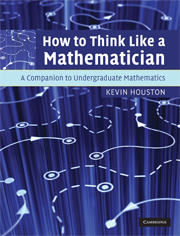Book contents
- Frontmatter
- Contents
- Preface
- I Study skills for mathematicians
- 1 Sets and functions
- 2 Reading mathematics
- 3 Writing mathematics I
- 4 Writing mathematics II
- 5 How to solve problems
- II How to think logically
- III Definitions, theorems and proofs
- IV Techniques of proof
- V Mathematics that all good mathematicians need
- VI Closing remarks
- Appendices
- Index
5 - How to solve problems
from I - Study skills for mathematicians
- Frontmatter
- Contents
- Preface
- I Study skills for mathematicians
- 1 Sets and functions
- 2 Reading mathematics
- 3 Writing mathematics I
- 4 Writing mathematics II
- 5 How to solve problems
- II How to think logically
- III Definitions, theorems and proofs
- IV Techniques of proof
- V Mathematics that all good mathematicians need
- VI Closing remarks
- Appendices
- Index
Summary
It isn't that they can't see the solution. It is that they can't see the problem.
G.K. Chesterton, The Scandal of Father Brown – ‘The Point of a Pin’Solving mathematical problems is hard and there is no magic formula which solves all problems. If there were, anyone could do it, and employers would not be so keen to hire problem-solving mathematicians. However, in this chapter we will try to provide at least some ideas on how to solve problems.
Let us first distinguish between an exercise and a problem. An exercise is something that can be solved by a routine method, for example finding the roots of a quadratic. A problem is something that will require more thought, for example, we have to draw together a number of ideas and perhaps apply a number of the routine methods learned through exercises, such as root finding, in a new combination to get the answer. However, in this book, to save writing out the phrase ‘exercises and problems’, we will group problems in with exercises. Nonetheless, knowing that there is really a distinction can help.
Much lower-level mathematics involves selecting and applying the right technique or formula to answer a question. While this is also true for some higher-level mathematics, we have the task of verifying the truth of statements, e.g. ‘There is an infinite number of prime numbers.’ The techniques needed for this type of problem are different from those of an apply-the-right-technique exercise.
- Type
- Chapter
- Information
- How to Think Like a MathematicianA Companion to Undergraduate Mathematics, pp. 41 - 50Publisher: Cambridge University PressPrint publication year: 2009



